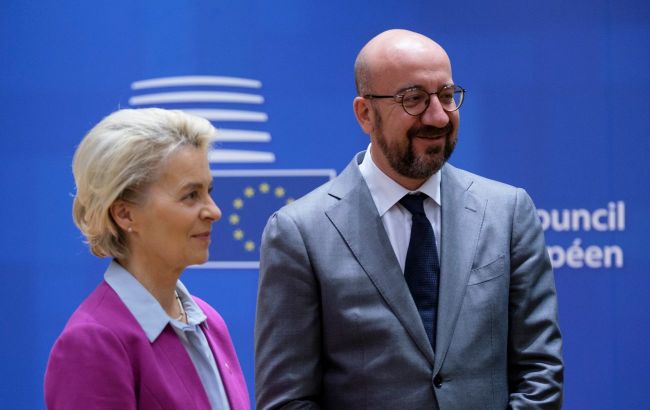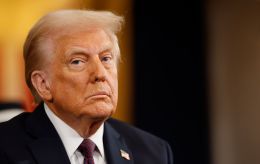Tensions in EU leadership hurt the bloc's course on wars in Ukraine and Israel - Bloomberg
 Commission President Ursula von der Leyen and European Council President Charles Michel (Photo: Getty Images)
Commission President Ursula von der Leyen and European Council President Charles Michel (Photo: Getty Images)
Tensions in relations between the President of the European Commission, Ursula von der Leyen, and the European Council President, Charles Michel, are undermining the effectiveness of the EU amid wars in Ukraine and Israel, as well as trade disputes with China, according to Bloomberg.
The publication notes that the disagreement "leaving the bloc flailing at a time when it needs to present a credible front on a growing list of issues from conflicts in Ukraine and Israel to trade and China."
In particular, the strain was noticeable in the U.S. when both leaders held separate meetings with President Joe Biden. This week, the President of the European Commission is conducting a major international summit to which Michel was not invited.
According to EU rules, it is the member countries that jointly determine the course of the bloc's foreign policy. At a time when China and the U.S. are becoming increasingly assertive in defending their economic interests, von der Leyen has decided to seek more influence in this area.
At the beginning of her five-year term in 2019, she declared that her commission would be geopolitical. Now, as her term comes to an end and the prospect of a second term emerges, few would say that she has not coped with the tasks set. However, her assertiveness often disappoints colleagues who feel they have to make important political decisions.
At the same time, allies of the President of the European Commission argue that her style not only does not lead to disagreements—it has helped her achieve more than any of her predecessors in giving the EU geopolitical weight.
She also became a voice of moral clarity after Russia's full-scale invasion of Ukraine. She pushed the bloc to adopt strong sanctions at a time when the leaders themselves—especially France and Germany—were more cautious.
However, von der Leyen's response to the conflict in the Middle East is often criticized. For example, she hastily expressed full support for Israel from the EU and condemned the HAMAS attack. At the same time, the European Union had already formulated a common position coordinated by the chief diplomat, Josep Borrell.
Von der Leyen's actions led to disagreements with colleagues over protocol and substance: many member countries privately accused her of not adequately addressing the humanitarian situation in Gaza.
Behind the scenes, European diplomats mainly were the only ones disapproving of von der Leyen, and several officials had to mend relations with Israel's regional neighbors after her later visit to Israeli Prime Minister Benjamin Netanyahu.
After von der Leyen's visit, EU member countries issued a statement clarifying their position to the Arab world and the global South. An emergency meeting of the European Council was also convened. According to one EU official, this summit was called as quickly as possible to repair the damage caused by the EU's initial reaction, which provoked an adverse reaction in Arab countries.
At the same time, von der Leyen's spokesperson said that she fully shares the EU's position outlined in the statement of the Council of the EU on October 15. Michel's spokesperson said he had made significant efforts in explanatory work with many partners to help avoid regional escalation and strengthen the EU's image and trust abroad.
The publication adds that von der Leyen remains a favorite in the race for a nomination for a second term as President of the European Commission after the elections to the European Parliament next year. However, some diplomats have told Bloomberg that they are beginning to question whether recent events will affect her chances.
Many European leaders criticize von der Leyen for her allegedly "too pro-Israeli" position. For instance, the President of the European Commission unequivocally supports Israel in repelling HAMAS terrorists despite the bombardment of the Gaza Strip and its humanitarian blockade.
Von der Leyen has also compared Russia to HAMAS, noting that Iran supplies over 90% of the latter's weapons.


